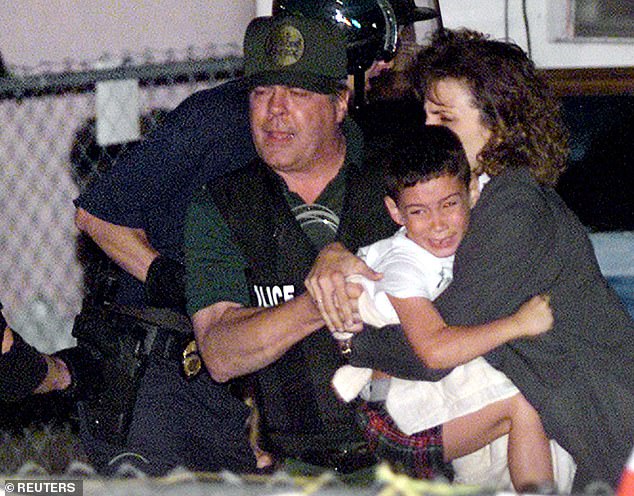A Florida fisherman who saved Cuban refugee Elián González Brotons after his mother fled with him to the United States has reflected on the heartbreaking encounter 25 years later.
On Thanksgiving Day 1999, Donato Dalrymple stumbled upon five-year-old Elián floating alone in the ocean, in what would prove to be a fateful moment in the history of the United States and Cuba.
Elián’s mother and her partner died during the dangerous journey through the Straits of Florida, as did almost all the other refugees aboard their makeshift aluminum boat.
The ensuing international tug-of-war custody battle between Elián’s father in Cuba and his distant relatives in Miami became a symbol of tensions between the socialist island and the United States for years to come.
Elián, now 30, is a government politician in Cuba, but his fame still precedes him. Fisherman Dalrymple has told the full story of the pivotal Thanksgiving that started it all.
Pictured: A U.S. agent carries Elián González as federal agents stormed the Cuban shipwreck survivor’s Miami home on April 22, 2000, and snatched him from his Miami relatives who were moving in the predawn hours to end a bitter international custody battle.
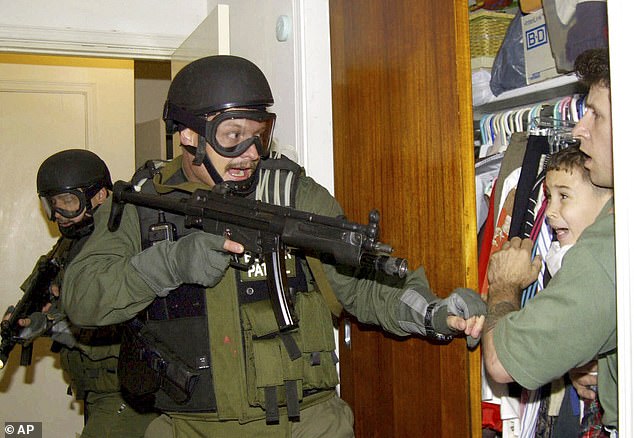
Pictured: Six-year-old Elián González, held in a closet by Donato Dalrymple, right, as government officials search for the boy at his relative’s home in Miami on April 22, 2000.
‘That morning the sea was very rough,’ Dalrymple told Cuban journalist Peniley Ramírez on her podcast chess pieceas he remembered braving the waves with his cousin Sam.
‘(There were) eight to 12 foot waves, and the sky I remember was black on one side and the daylight was appearing, and there was like a rainbow out there.
“We hit an inner tube and that’s where it all started for me.”
Dalrymple said he saw what he thought was a body inside the tube and warned his cousin about what they were about to find.
“But then I looked again and I saw a hand move,” Dalrymple said. The fisherman ran towards the survivor.
“Before I could blink, my cousin was in the water saying ‘it’s a baby, it’s a baby,'” Dalrymple recalled.
‘What he said was a baby, it was a five-year-old boy. When I took him in my arms I asked him, are you okay? and he didn’t answer me.
‘So I said, do you speak Spanish? and he said, yes.
‘We had found a child floating about three miles off the coast of Fort Lauderdale.
“He looked like a little angel, I mean, he looked so fresh.”
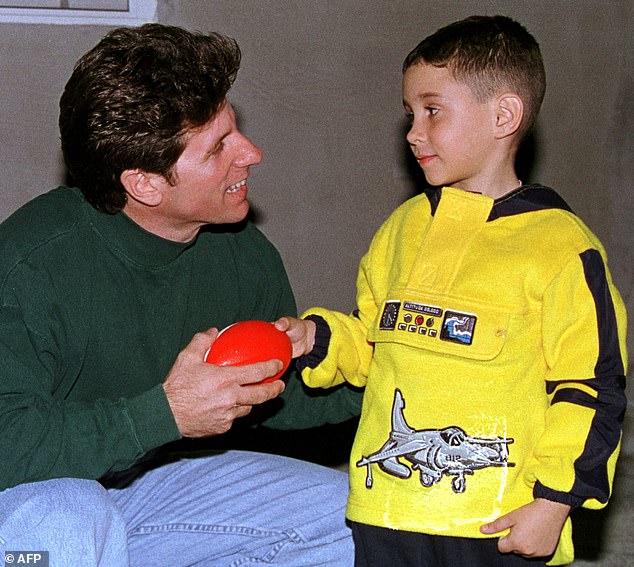
Pictured: Elián González, age six, receives a toy soccer ball as a Christmas gift from Donato Dalrymple of Fort Lauderdale, FL, at Elián’s relatives’ home in Miami on December 24, 1999. Dalrymple He is the fisherman who helped rescue González from the Straits of Florida. months before
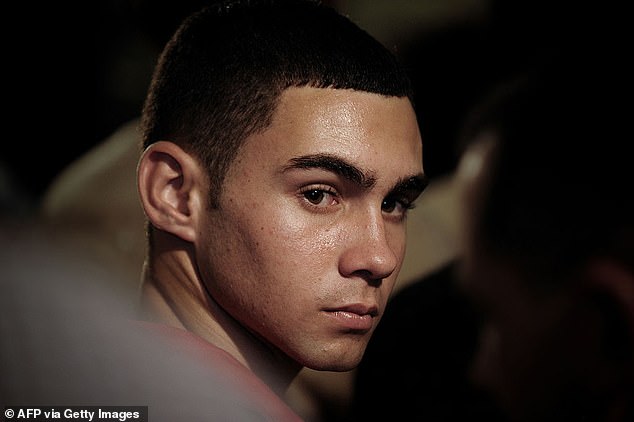
In the photo: González on June 30, 2010, on the tenth anniversary of his return to Miami.
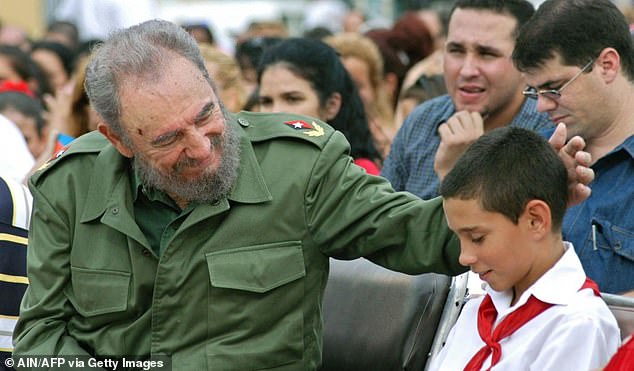
In the photo: Cuban President Fidel Castro caresses the head of Elián González, during a graduation ceremony in Cárdenas, on July 21, 2005.
At that moment, Elián had been drifting alone through the tumultuous ocean for at least a day.
The fishermen gave him orange juice and a sweatshirt before taking him to dry land, where an ambulance and the media were already waiting.
“He made a sour face, like he wanted to cry, but he never cried,” Dalrymple said.
‘I just looked up at the sky. I didn’t realize at the time that this would become another mission for me.’
The boy’s mother, Elizabeth Brotons, died along with 10 other refugees on the raft.
Along with Elián, a young couple -Nivaldo Fernández Ferrán and Arianne Horta-Alfonso- were the only survivors.
According to Fernández Ferrán, ‘Isabel protected her son until the end.’
He told media at the time that the boat’s engine had failed and the vessel began to fill with water.
As it sank, refugees clung to inner tubes as 10-foot waves battered them.
Elián said his mother’s partner put him inside one of the tubes and he drifted in and out of sleep as the ocean rocked him.
When he woke up heading to Florida, his mother was no longer there. His body was never found.
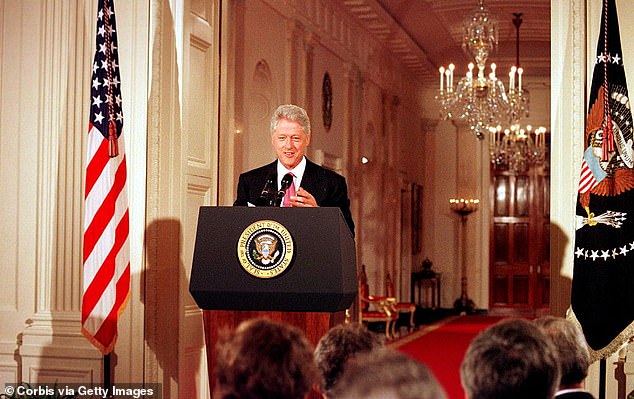
Pictured: Then-President Bill Clinton held a press conference in the East Room of the White House where he discussed topics such as the custody battle over Elián González in 1999.
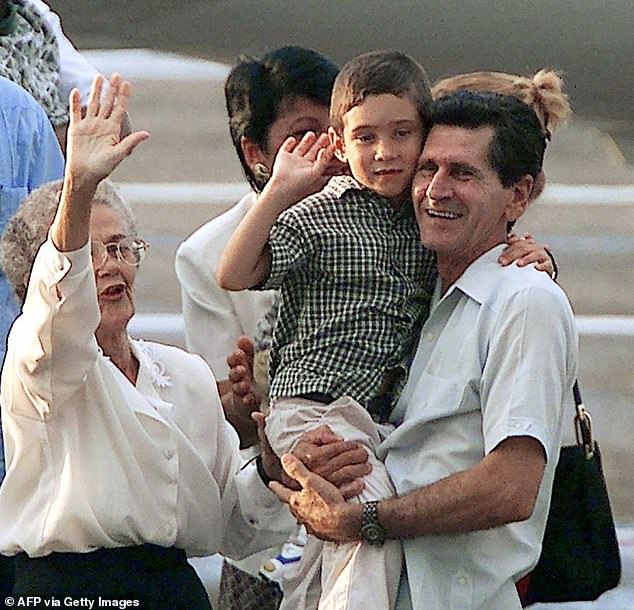
In the photo: Elián González (C), a six-year-old Cuban castaway, is carried by his paternal grandfather Juan González (R) alongside his great-grandmother Ramona (L) upon Elián’s arrival from the United States on June 28, 2000 to the José Martí airport in Havana.
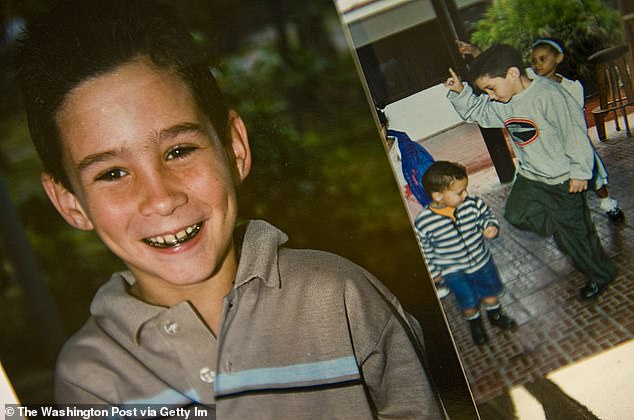
In the photo: Photographs of Elián González when he was seven or eight years old and while he was teaching his younger brother Yanni to dance in Cuba.
The boy was taken to live with relatives in Miami but his father, Juan Miguel, who was separated from his mother and had remained on the island, demanded that Elián be returned.
The dispute became a headline-grabbing international custody battle that weighed heavily in the 2000 presidential race between George W. Bush and Al Gore.
Fidel Castro supported the case with the full weight of the Cuban government, mobilizing seven months of massive demonstrations calling for Elián’s repatriation.
As the two sides fought over the high-profile case in court, U.S. immigration officials decided to place Elián in the custody of his father, who had come to the United States to advocate for his return.
His relatives in Miami refused to accept him, so armed federal agents raided Elián’s uncle’s house and seized the boy.
It was one of the few moments since 1959 when the Cold War rivals agreed on something: The American legal system ruled that González should be returned to his father.
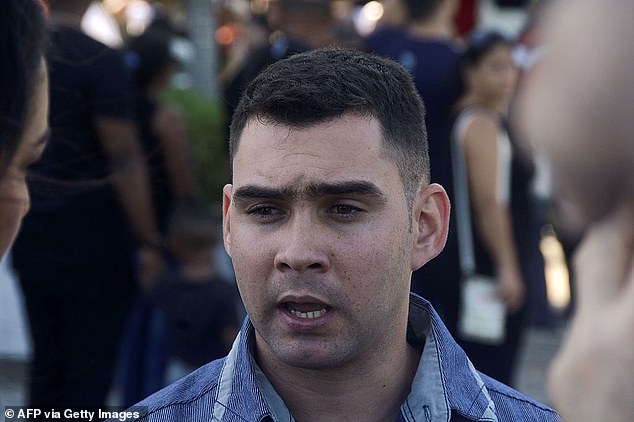
Pictured: Elián González speaks to the press in Havana’s Plaza de la Revolución, where people pay their respects to Cuban revolutionary leader Fidel Castro on November 29, 2016.
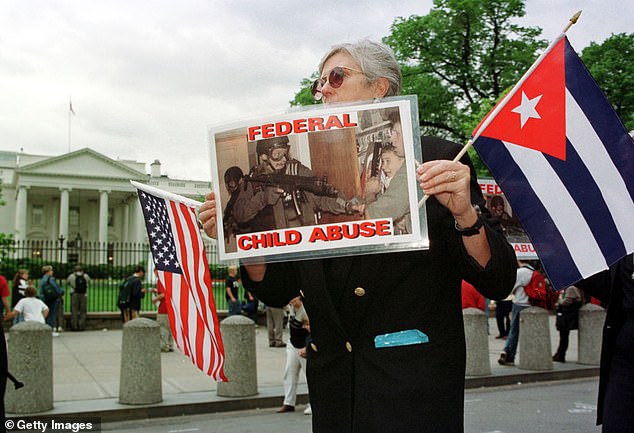
A member of Mothers Against Repression holds a photograph showing a federal agent with an automatic rifle confronting fisherman Donato Dalrymple holding Elián González in a closet during a demonstration in front of the White House on April 26, 2000 Washington, DC
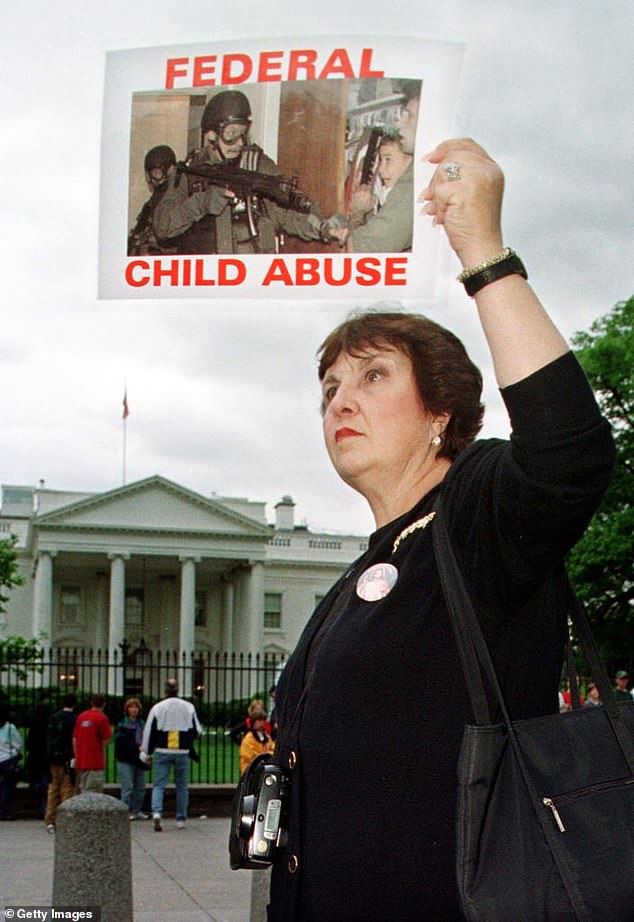
Elián and his father Juan Miguel González had been transferred to the Plantation while relatives from Miami continued their attempts to visit Elián at the time of the aforementioned protest.
A state celebration was held for the tenth anniversary of his return to Cuba.
Fast forward to April 2023, and Elián was elected to the National Assembly of People’s Power, representing Cárdenas, Cuba.
‘From Cuba we can do a lot so that we have a more solid country, and I owe it to the Cubans,’ he said during an exclusive interview with the AP at the time.
“That is what I am going to try to do from my position, from this place in Congress: contribute to making Cuba a better country.”
‘Not having my mother has been difficult, it has been a burden, but it has not been an obstacle when I have had a father who has defended me and has been by my side,’ he added.
Elián is also now the father of a two-year-old daughter.
He also worked for a state-owned company that facilitates tourism to the island nation his mother left behind, underscoring the alternative path his life has taken since his return home.


